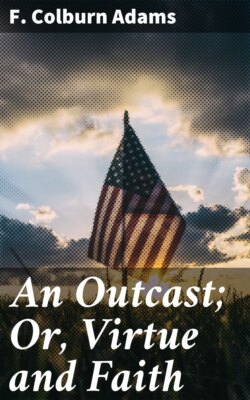Читать книгу An Outcast; Or, Virtue and Faith - F. Colburn Adams - Страница 9
На сайте Литреса книга снята с продажи.
Оглавление"A new loafer let loose on the world!" says the vote-cribber, entering the domain of the inebriate with a look of fierce scorn. "The State is pestered to death with such things as you. What do they send you here for?—disturbing the quiet and respectability of the prison! You're only fit to enrich the bone-yard—hardly that; perhaps only for lawyers to get fees of. The State'll starve you, old Hardscrabble'll make a few dollars out of your feed—but what of that? We don't want you here." There was something so sullen and mysterious in the coarse features of this stalwart man—something so revolting in his profession, though it was esteemed necessary to the elevation of men seeking political popularity—something so at variance with common sense in the punishment meted out to him who followed it, as to create a deep interest in his history, notwithstanding his coldness towards the inebriate. And yet you sought in vain for one congenial or redeeming trait in the character of this man.
"I always find you here; you're a fixture, I take it—"
The vote-cribber interrupts the inebriate—"Better have said a patriot!"
"Well," returns the inebriate, "a patriot then; have it as you like it. I'm not over-sensitive of the distinction." The fallen man drops his head into his hands, stabbed with remorse, while the vote-cribber folds his brawny arms leisurely, paces to and fro before him, and scans him with his keen, gray eyes, after the manner of one mutely contemplating an imprisoned animal.
"You need not give yourself so much concern about me—"
"I was only thinking over in my head what a good subject to crib, a week or two before fall election, you'd be. You've a vote?"
Tom good-naturedly says he has. He always throws it for the "old Charleston" party, being sure of a release, as are some dozen caged birds, just before election.
"I have declared eternal hatred against that party; never pays its cribbers!" Mingle scornfully retorts; and having lighted his pipe, continues his pacing. "As for this jail," he mutters to himself, "I've no great respect for it; but there is a wide difference between a man who they put in here for sinning against himself, and one who only violates a law of the State, passed in opposition to popular opinion. However, you seem brightened up a few pegs, and, only let whiskey alone, you may be something yet. Keep up an acquaintance with the pump, and be civil to respectable prisoners, that's all."
This admonition of the vote-cribber had a deeper effect on the feelings of the inebriate than was indicated by his outward manner. He had committed no crime, and yet he found himself among criminals of every kind; and what was worse, they affected to look down upon him. Had he reached a state of degradation so low that even the felon loathed his presence? Was he an outcast, stripped of every means of reform—of making himself a man? Oh no! The knife of the destroyer had plunged deep—disappointment had tortured his brain—he was drawn deeper into the pool of misery by the fatal fascinations of the house of Madame Flamingo, where, shunned by society, he had sought relief—but there was yet one spark of pride lingering in his heart. That spark the vote-cribber had touched; and with that spark Tom resolved to kindle for himself a new existence. He had pledged his honor to the young theologian; he would not violate it.
The old sailor, with elated feelings, and bearing in his hands a bowl of coffee and two slices of toasted bread, is accosted by several suspicious-looking prisoners, who have assembled in the corridor for the purpose of scenting fresh air, with sundry questions concerning the state of his pupil's health.
"He has had a rough night," the sailor answers, "but is now a bit calm. In truth, he only wants a bit of good steering to get him into smooth weather again." Thus satisfying the inquirers, he hurries up stairs as the vote-cribber hurries down, and setting his offering on the window-sill, draws from his bosom the concealed flask. "There, Tom!" he says, with childlike satisfaction, holding the flask before him—"only two pulls. To-morrow reef down to one; and the day after swear a dissolution of copartnership, for this chap (he points to the whiskey) is too mighty for you."
Tom hesitates, as if questioning the quality of the drug he is about to administer.
"Only two!" interrupts the sailor. "It will reduce the ground-swell a bit." The outcast places the flask to his lips, and having drank with contorted face passes it back with a sigh, and extends his right hand. "My honor is nothing to the world, Spunyarn, but it is yet something to me; and by it I swear (here he grasps tighter the hand of the old sailor, as a tear moistens his suffused cheeks) never to touch the poison again. It has grappled me like a fierce animal I could not shake off; it has made me the scoffed of felons—I will cease to be its victim; and having gained the victory, be hereafter a friend to myself."
"God bless you—may you never want a friend, Tom—and may He give you strength to keep the resolution. That's my wish." And the old sailor shook Tom's hand fervently, in pledge of his sincerity.
